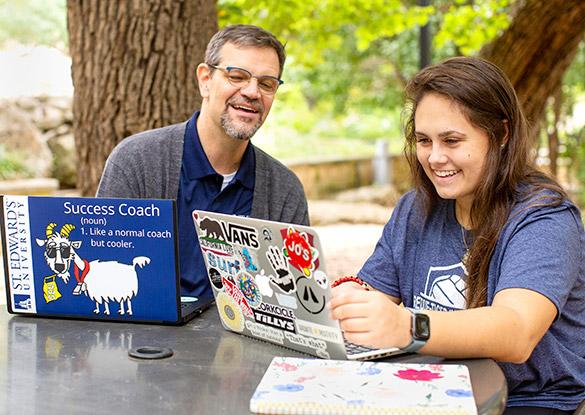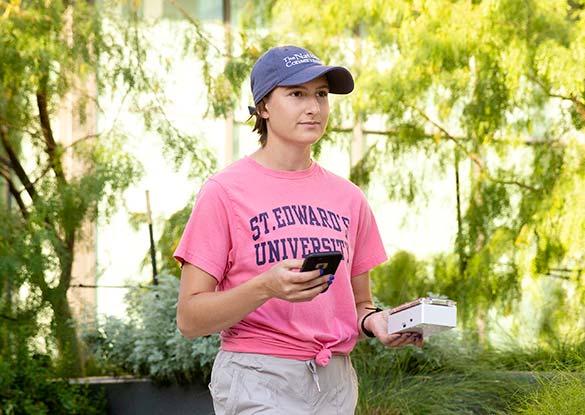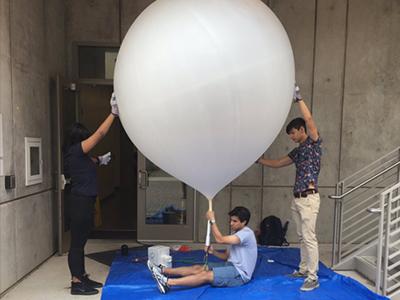Pursue your passion for problem-solving with a major in Mathematics, and prepare for high-impact careers in engineering, statistics, finance, cryptography, aeronautics, scientific research or business.

Major Roadmap
Explore your options — classes, internships, research and study abroad. Use the Mathematics BA Major Guide or Mathematics BS Major Guide to find what interests you, discover what you love, and create a major experience that jumpstarts your future.
Deepen your understanding of calculus, modern algebra, physics and statistics, and build your programming and computational skills in applied computer science courses.
Partner with professors to conduct research in your areas of interest, whether that’s biology or political science. You’ll benefit from the university’s state-of-the-art computer infrastructure, software and data storage for innovative research. Take advantage of Austin’s dynamic technology and innovation scene and the mathematics meetings that happen in the city each semester. Leave St. Edward’s ready to continue your education in graduate school or immediately begin your career in urban development, market research, computer technology, government or teaching.
What do our graduates do?
Mathematics majors go on to a variety of careers and graduate schools from St. Edward’s. Here’s a sample.
- Data analyst for Apple
- Procurement analyst for SpaceX
- Data analyst for the National Security Agency
- Mechanical designer at Fugro Oil & Energy Company
- Full stack developer at T3
- Graduate research fellow at the Harvard-Smithsonian Center for Astrophysics
- PhD candidates in Mathematics at The University of Texas at Austin, Human & Statistical Genetics at Washington University, and Physics at Vanderbilt University and Case Western Reserve University
- Master’s students in mathematics at Emory University, the ESTEEM Graduate Program for entrepreneurship at the University of Notre Dame, mechanical engineering at Purdue University and University of Texas, statistics and data science at the University of Houston, and education and school leadership at Harvard University.

A Day at St. Edward’s
A summer internship connects Mathematics major Stella Cunningham ’21 to the city of Austin and a possible career. Read about her day as a St. Edward's University student and the exciting research she completed.
The Classroom and Beyond
As a Mathematics major, you’ll be part of a community of students and professors who value creativity and the courage to tackle difficult, unsolved problems. You’ll build these relationships alongside your problem-solving skills in classes, research projects, competitions and extracurricular clubs.
Experiential Education
A core component of the St. Edward’s mathematics program is a four-semester sequence of research courses. In these classes, you’ll conduct open-ended research on unsolved problems individually with faculty members. You’ll present your findings at regional and national professional conferences, where you’ll meet other mathematicians and learn about graduate-school options and careers in your field.
Mathematics majors participate in the William Lowell Putnam Mathematics Competition, the preeminent math competition for undergraduates worldwide. A typical competition involves two 3-hour sessions in which students solve 12 problems. Thousands of math majors nationwide score 0 points every year due to the hyper-strict grading scale, so any positive score is a noteworthy accomplishment. In the past decade, four students from St. Edward’s have earned a positive score on the exam.
Student Organizations
The St. Edward’s Math Club is a student chapter of the Mathematics Association of America. Members have traveled together to regional mathematics conferences, presented math concepts and helped with science fairs at local schools, and participated in the global MegaMenger collaborative fractal build. The club also hosts student and alumni research talks and serves as a forum for social events like Halloween pumpkin carving, bowling, laser tag and pizza parties.
The St. Edward’s Maker Club attracts tinkerers and programmers who have worked on projects involving 3-D printing, soldering, programming LED strips, and creating art through programming.
Teaching Assistantships
Strong students with an interest in teaching and mentoring can serve as teaching assistants for introductory classes. At St. Edward’s, all classes are taught by professors, but student teaching assistants help tutor and lead study sessions. You’ll expand your communication and people skills by helping other students learn the material. If you’re interested in teaching, you could also become a tutor in the Math Lab.
Tracks and Degree Requirements
Students pursuing a degree in mathematics have two options to choose from. This helpful course map shows the sequence of prerequisites in the department.
1. Bachelor of Arts in Mathematics
This program provides a comprehensive exploration of mathematics that prepares students for advanced programs or professional careers. This option offers more latitude in the choice of general electives and is appropriate for students seeking a double major or minor.
Major Requirements: The BA in Mathematics requires 56-59 hours of Mathematics major courses, including supporting courses in subjects such as Computer Science or Physics.
General Education Requirements: In addition to the major program requirements, all students must satisfy the general education requirements. Talk with your success coach and faculty advisor about which courses are right for you.
View and download the full degree plan for the BA in Mathematics major (PDF).
2. Bachelor of Science in Mathematics
This program includes the same coursework as the Bachelor of Arts in Mathematics but with two additional semesters of laboratory science. This option explores calculus, modern algebra and other advanced topics in their purest form. Additionally, students learn to design and interpret prediction models for diverse industries, such as aeronautics, urban development and green energy.
Major Requirements: The BS in Mathematics requires 67-70 hours of Mathematics major courses, including supporting courses in subjects such as Computer Science, Physics and Biology.
General Education Requirements: In addition to the major program requirements, all students must satisfy the general education requirements. Talk with your success coach and faculty advisor about which courses are right for you.
View and download the full degree plan for the BS in Mathematics major (PDF).
Questions about placement into Mathematics courses? Refer to our placement guide for more information.
The Department of Mathematics also offers a dual degree option in Mathematics and Engineering.
Research
As part of your coursework at St. Edward’s, you will complete four semesters of research. You will have the option to further develop this research and present your findings at conferences and for publication. Recently, Mathematics majors have studied the following:
- Mathematical analysis of lottery voting
- Dark energy, the force that causes the universe to expand
- Detecting whether congressional districts are racially gerrymandered
- The effects of storm-related electrical changes on tropospheric ozone levels
Most math majors travel to at least one conference during their time at St. Edward’s. These include:
- Texas Undergraduate Mathematics Conference
- Joint Mathematics Meetings of the American Mathematical Society and the Mathematical Association of America
- MAA Texas Section Meeting
- Mathfest
- National Conference for McNair Scholars and Undergraduate Research
Outstanding students have been selected for Research Experiences for Undergraduates, in which they join the lab of a professor at a major research university over a summer. These experiences help you decide if a career in research is right for you. In recent years, Mathematics majors have completed these REUs:
- Deep learning – specifically, teaching computers to identify the content of an image – at the Center for Imaging Science at the Rochester Institute of Technology
- Research in the Mathematical Biosciences Institute Program at Indiana University-Purdue University Indianapolis
You’ll also have the opportunity to contribute to other research projects led by your professors. During Hurricane Harvey, which battered southern Texas in August 2017, several Mathematics majors, along with Natural Sciences professors and staff, collected meteorological data with weather balloons. They released 13 weather balloons that collected data used by the National Weather Services to create forecasts during the hurricane. Some of the students who participated also wrote code to automate the computation of data collected from the balloons and to visually display the data in graphs.
Internships
You’ll also be encouraged to complete an internship to apply your mathematical skills in a professional context. Mathematics majors have recently interned at the following organizations:
- Exxon
- Molecular Rebar Design
- The Nature Conservancy
- National Ecological Observatory Network
- Department of Homeland Security STEM Summer Internship Program
- Society for Industrial and Applied Mathematics
- SpaceX
As a student in the Mathematics program you are afforded access to the funding programs, including paid internships, offered exclusively to STEM students at St. Edward’s University by the Institute for Interdisciplinary Science (i4). For more information on these programs please visit the Institute for Interdisciplinary Science (i4) on the web.
Our Faculty

"Our mathematics faculty members have research backgrounds spanning a variety of fields -- low-dimensional topology, data science, combinatorics, dynamical systems, algebraic geometry, history of mathematics, and mathematics education, to name a few -- but they share in common a passion for teaching undergraduates, mentoring student research endeavors, and instilling an appreciation for mathematics in its broadest sense."
– Carol Gee, Professor of Mathematics and Department Chair
Mathematics Minor
Students minoring in Mathematics must satisfactorily complete the following courses in addition to 6 hours of electives:
Required Courses:
- Calculus I, Lab
- Calculus II
- Calculus III
- Linear Algebra
- Differential Equations
Elective Courses:
- Discrete Mathematics or Inquiry and Proof
- MATH 3000+ upper-division courses (excluding 4150 and 4157)
Are you a current student? Contact your advisor for next steps on declaring your major or minor.

Math Students Launch Balloons into Hurricane Harvey
Three math majors assisted faculty with graduate-level research to produce the only sounding data available in Southcentral Texas during Hurricane Harvey.